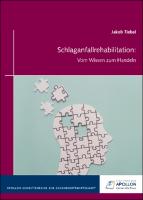Schlaganfallrehabilitation
Vom Wissen zum Handeln
| dc.contributor.author | Tiebel, Jacob | |
| dc.date.accessioned | 2021-12-22T16:17:12Z | |
| dc.date.available | 2021-12-22T16:17:12Z | |
| dc.date.issued | 2021 | |
| dc.identifier | OCN: 1294648839 | |
| dc.identifier.uri | https://library.oapen.org/handle/20.500.12657/52175 | |
| dc.description.abstract | Physiotherapy and occupational therapy in stroke rehabilitation has developed over the last decades into an evidence-based therapeutically science and includes forms of therapeutic treatment in which patient-oriented decisions are to be made explicitly on the basis of proven effectiveness. The starting point of this book are observations that indicate contradictions between everyday practice and the findings of the therapeutic sciences. This results in considerable difficulties in the transfer of theory to practice. The aim of this book was to present the problem from a psychological point of view, to discuss the consequences and to think about possible ways to overcome the gap between theory and practice. The current state of research on transfer of theory to practice in neurorehabilitation and the results of problem-centered interviews with experts will be presented. In summary, the results show that therapeutic behavior is influenced by a complex interaction of opportunities, capabilities and motivation. On all three levels, there are a variety of possible approaches for improvement. There are many indications that a change in behavior is possible, but that this change requires comprehensive approaches at all levels (abilities, opportunities and motivation). The results also show that appropriate actions must be tailored to the respective settings and target groups. | en_US |
| dc.language | German | en_US |
| dc.subject.classification | thema EDItEUR::M Medicine and Nursing::MQ Nursing and ancillary services::MQS Physiotherapy | en_US |
| dc.subject.other | Rehabilitation; Physiotherapie; Ergotherapie; Theorie-Praxis-Transfer; Schlaganfall | en_US |
| dc.title | Schlaganfallrehabilitation | en_US |
| dc.title.alternative | Vom Wissen zum Handeln | en_US |
| dc.type | book | |
| oapen.abstract.otherlanguage | Die evidenzbasierte Physiotherapie und Ergotherapie in der Schlaganfallrehabilitation hat sich in den letzten Jahrzehnten zu einer auf Beweismaterial gestützten Heilkunde entwickelt und umfasst heute Formen der therapeutischen Behandlung, bei denen patientenorientierte Entscheidungen ausdrücklich auf der Grundlage von nachgewiesener Wirksamkeit getroffen werden sollen. Ausgangspunkt dieses Buches sind Beobachtungen, die auf Widersprüche zwischen der gelebten Praxis und den Erkenntnissen der Therapiewissenschaften hindeuten. Daraus ergeben sich Schwierigkeiten im Theorie-Praxis-Transfer. Die Zielsetzung der vorliegenden Arbeit bestand darin, die Problematik aus psychologischer Sicht darzustellen, die Konsequenzen zu diskutieren und mögliche Wege zur Überwindung der Theorie-Praxis-Kluft anzudenken. Präsentiert werden hierzu der aktuelle Stand der Forschung zum Theorie-Praxis-Transfer in der Neurorehabilitation und die Ergebnisse problemzentrierter Interviews mit Experten. In der Zusammenschau zeigen die Ergebnisse, dass therapeutisches Verhalten durch ein komplexes Zusammenspiel aus Gelegenheiten, Fähigkeiten und Motivation beeinflusst wird. Auf allen drei Ebenen bieten sich vielfältige Ansatzmöglichkeiten zur Verbesserung. Vieles deutet darauf hin, dass eine Verhaltensänderung möglich ist, diese jedoch umfassende Ansätze auf allen Ebenen erfordert (Fähigkeiten, Gelegenheiten und Motivation). Zudem geht aus den Ergebnissen hervor, dass entsprechende Maßnahmen auf die jeweiligen Settings und Zielgruppen zugeschnitten werden müssen. | en_US |
| oapen.relation.isPublishedBy | fcd4452b-4bc4-462c-bb0a-a171b4f362f3 | en_US |
| oapen.collection | AG Universitätsverlage | |
| oapen.pages | 140 | en_US |

